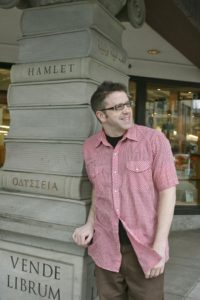Indie Bookstore Love: The Powell’s Interview
 What can we say about Powell’s Books? It’s a huge, used-and-new, independent bookstore in downtown Portland that takes up a whole city block, plus a couple of smaller but still large and equally interesting outlying stores. It’s one of the best things about living in Portland, and any time we need inspiration—professional or otherwise—we head straight to one of their locations to get lost in the stacks. It never fails.
What can we say about Powell’s Books? It’s a huge, used-and-new, independent bookstore in downtown Portland that takes up a whole city block, plus a couple of smaller but still large and equally interesting outlying stores. It’s one of the best things about living in Portland, and any time we need inspiration—professional or otherwise—we head straight to one of their locations to get lost in the stacks. It never fails.
Powell’s has also been one of Microcosm’s longest running customers. Starting almost 20 years ago, when Joe moved the business from Cleveland to Portland (you can read about those early days in his new book, Good Trouble), and continuing to this month when we’re partnering with Powell’s to spread the indie bookstore love. All month, Powell’s is featuring our newest edition of The Zinester’s Guide to Portland at every register. And for a week mid-month, you can see a display of Microcosm books at their downtown store—keep an eye out for it.
For this month, we asked Kevin Sampsell, who we’ve long had the pleasure of working with during his 15 years and counting reign over the downtown Powell’s storied Small Press section. When not curating the zine rack and slinging books, Kevin’s writing, editing, and running his own small press, Future Tense Books.
1. What’s your history working with Powell’s? How did you become the Small Press guy?
I started working at Powell’s at the end of 1997 as a holiday temp but I dug my claws in and worked hard and passionately so they couldn’t let me go. In 1998, I became an events coordinator, which means I get to schedule and host author events at the store, which is a privilege and a thrill. I became the small press guy around 2001. My predecessors were the amazing Vanessa Renwick and the late great Marty Kruse. Running the small press section is almost like running my own store. It’s an amazing experience. I love my jobs.
2. Do you remember your first encounter with Microcosm? Do you have any embarrassing or hair raising stories about our early days in Portland?
I remember Joe riding his bike down to the store with his plastic buckets strapped on with all the zines and books crammed into them. A couple of times the zines would be a little rough around the edges or dirty from the rain or dirt. I’d have to flatten out things or wipe them clean before I put them out on the shelf.
3. What’s your favorite Microcosm book or zine?
I was a big supporter of the Zinester’s Guide to Portland, even in its first pamphlet-size format. I thought it was a good idea, and before Microcosm had bigger distribution, I’d be the one who had to email you guys and ask for more. Eventually, after the more polished paperback editions came out, our main book purchasers wised up and started buying them in chunks of hundreds. It’s been one of our most consistent best-selling books in the store for several years now.
Some of my other favorites over the years have been Coffeehouse Crushes, Indestructible by Cristy Road, Sarah Royal’s The Book Bindery, the About My Disappearance zines by Dave Roche, and Sarah Mirk’s Sex From Scratch.
4. You’ve been a mentor and something of a bellwether for Portland’s small press and zine culture. How have you watched those scenes change over time? What do you predict for the future?
Thank you. I have always enjoyed supporting small presses and individuals through my job. The scene here has grown just as the city has grown–very quickly and with a wide swath. I think we’re slowly getting more diverse and inclusive and there’s a beautiful synergy that can often be witnessed between established writers and authors and newer writers coming up. I think that’s one of the reasons writers keep moving here, because they know something special is happening here. But in the last couple of years, the rent problems are making it a challenge to stay here. It’s a trend (the higher cost of living) that I hope doesn’t continue because when you discourage the creative class—who often come from financial struggle–it results in the sad decline of artistic excitement in a city. I don’t want that part of Portland to be “over”—I want it to to stay a haven for artists and risk-takers.